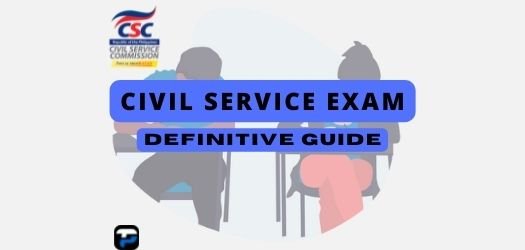The Philippine Constitution exam covers various topics related to the 1987 Constitution of the Philippines. It’s a test designed to measure your knowledge and understanding of the fundamental law of the country.
Topics covered in this portion may include principles and structure of government, fundamental rights, local and national governance, and processes of amendment and revision.
Philippine Constitution CSE reviewer
Question 1. What do you call the introductory part of the Constitution?
A. Preface
B. Amendments
C. Preamble✅
D. Bill of Rights
Question 2. What form of government does the Philippines adopt?
A. Republican
B. Democratic
C. neither A nor B
D. both A and B✅
Question 3. What is the power of the State to take private property for public use upon payment of just compensation?
A. right of confiscation
B. right to limit resources
C. right of sequestration✅
D. right of eminent domain
Question 4. Who among the following may issue a warrant of arrest or a search warrant?
A. a senator
B. a judge✅
C. a congressman
D. the President
Question 5. A foreigner may acquire Filipino citizenship through ________.
A. naturalization✅
B. extradition
C. rebirth
D. Visa application
Question 6. The right to vote is also known as ____.
A. suffrage✅
B. naturalization
C. democracy
D. plebiscite
Question 7. How many Senators are there in the Senate?
A. twenty-five
B. twenty-four✅
C. twelve
D. thirty
Question 8. What is the minimum age requirement for a Senator?
A. thirty
B. twenty-five
C. twenty
D. thirty-five✅
Question 9. Which of the following bills do not originate from the House of Representatives?
A. Appropriation bills
B. Revenue of tariff bills
C. Amnesty✅
D. Private bills
Question 10. The members of the Lower House are:
A. elected by region and by party list
B. elected by region and appointed by the President
C. elected by district and party list✅
D. elected by district and appointed by the Senators
Question 11. The legislative power of the government shall be vested in the _______.
A. President
B. Congress✅
C. Supreme court
D. all of the above
Question 12. Which of the following may disqualify a person from running for the Presidency?
A. He is sixty years old on the day of the election.
B. He lived abroad for five years preceding the election.✅
C. He has Filipino parents but was born in the United States.
D. He is a registered voter.
Question 13. Which of the following shows the transfer of power should the President be incapable of discharging his duties?
A. President → Vice President → Senate President → House Speaker✅
B. President → Vice President → Chief Justice → Senate President
C. President → Vice President → Chief Justice → House Speaker
D. President → Vice President → House Speaker → Senate President
Question 14. A member of the Supreme Court _____.
A. must have been a judge of a lower court for fifteen years or more.✅
B. must have been a judge of the Court of Appeals for ten years.
C. may not be a member of the Philippine Bar.
D. may be a naturalized citizen.
Question 15. The Supreme Court is composed of
A. a Chief Justice and fourteen Associate Justices.✅
B. two Chief Justices and fourteen Associate Justices.
C. Chief Justice and twelve Associate Justices.
D. Chief Justice and an indefinite number of Associate Justices.
Question 16. Which of the following is a Constitutional Commission?
A. Commission of Human Rights
B. Philippine Commission on Good Government
C. Civil Service Commission✅
D. Commission on Natural Resources
Question 17. What branch of government has the sole right to initiate all cases of impeachment?
A. Senate
B. Commission on Election
C. House of Representatives ✅
D. Judiciary
Question 18. Which of the following is not removable from office by impeachment?
A. Member of the Supreme Court
B. Member of the Constitutional Commissions
C. The Ombudsman
D. Senators✅
Question 19. The national language of the Philippines is?
A. Pilipino
B. English and Filipino
C. Tagalog
D. Filipino✅
Question 20. Who may propose any amendment to or revision of the Constitution?
A. Congress or a Constitutional Convention✅
B. Congress and a Constitutional Convention
C. Judiciary and Congress
D. Judiciary and Constitutional Convention
Question 21. What tax is paid by individuals who derive compensation income?
A. Value-added tax
B. Excise tax
C. Income tax✅
D. Real state tax
Question 22. When is the deadline for filing income tax returns for every taxable year?
A. April 15✅
B. April 30
C. March 15
D. March 30
Question 23. Which of the following statements is true about taxes?
A. It is a voluntary payment.
B. It is payable both in cash and in kind.
C. It is an enforced contribution.✅
D. It is based on one’s desire to pay.
Question 24. What tax is imposed on one’s right to transmit property at death, and is measured by the value of the property?
A. Excise tax
B. Withholding tax
C. Donor’s tax
D. Estate tax✅
Question 25. Which of the following is classified as being a “Head of the Family” for income tax purposes?
A. a married individual with dependents
B. an unmarried individual with dependents✅
C. a married individual without dependents
D. an unmarried individual without dependents
Question 26. What Act implements the mandate for the state to make essential goods, health, and other social services available to all people at an affordable cost?
A. Land Reform Program
B. Generics Act✅
C. Resettlement Act
D. Freedom Act
Question 27. Which of the following is true about elective local officials?
A. The term of office is three years.✅
B. Barangay officials’ term of office is indefinite
C. An official may be reelected indefinitely
D. An official may not serve for less than three terms
Question 28. What may be classified as alienable lands of the public domain?
A. forest
B. mineral funds
C. national park
D. agricultural lands✅
Question 29. What is the maximum equity for aliens in a corporation or association in the exploration development and utilization of natural resources?
A. 60%
B. 40%✅
C. 50%
D. 30%
Question 30. What is recognized by the State as the foundation of the nation?
A. barangay
B. community
C. family✅
D. municipality



